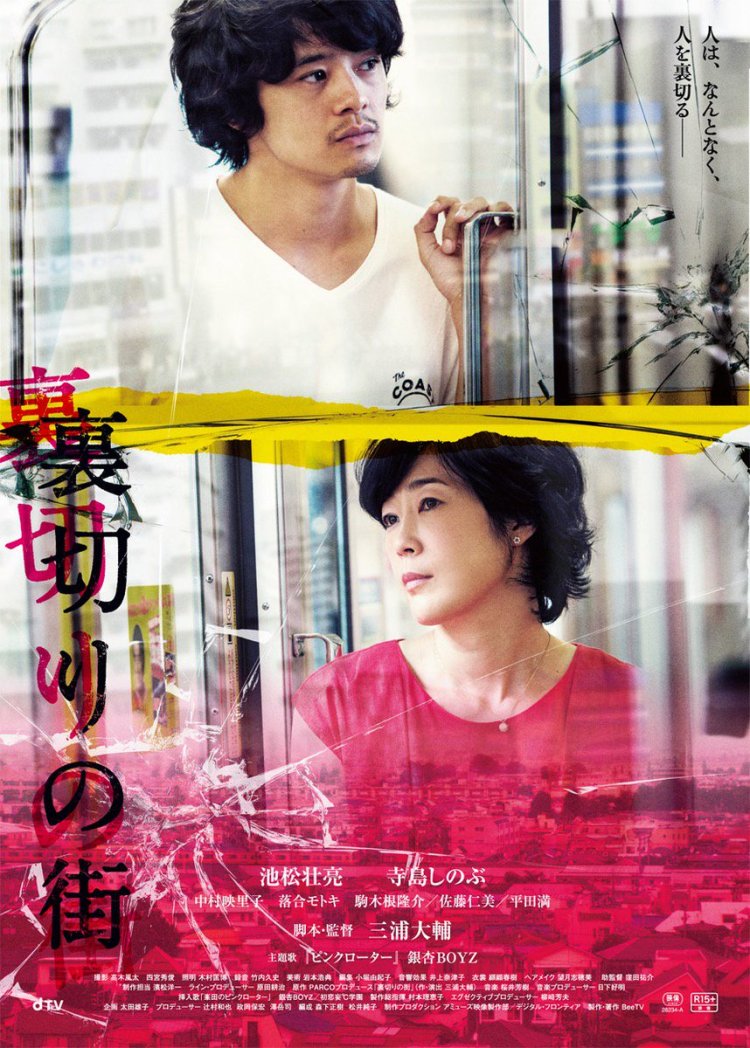 What is it that makes one person betray another? Following Love’s Whirlpool, playwright and Be My Baby author Daisuke Miura returns to the world of messy modern love with a tale ridden with infidelity and the impossibility of trust. Despite being in outwardly successful relationships, the central characters find themselves seeking something, trying to eclipse some element of dissatisfaction which is more with themselves than with their partners by burying it in a meaningless affair which only becomes less meaningless as time goes on. Formerly a TV drama now recut for the big screen The City of Betrayal (裏切りの街, Uragiri no Machi) is a melancholy and contemplative piece but one which shares Miura’s rather depressing view of romance with its inherent difficulties and contradictions.
What is it that makes one person betray another? Following Love’s Whirlpool, playwright and Be My Baby author Daisuke Miura returns to the world of messy modern love with a tale ridden with infidelity and the impossibility of trust. Despite being in outwardly successful relationships, the central characters find themselves seeking something, trying to eclipse some element of dissatisfaction which is more with themselves than with their partners by burying it in a meaningless affair which only becomes less meaningless as time goes on. Formerly a TV drama now recut for the big screen The City of Betrayal (裏切りの街, Uragiri no Machi) is a melancholy and contemplative piece but one which shares Miura’s rather depressing view of romance with its inherent difficulties and contradictions.
Yuichi (Sosuke Ikematsu) is a young man with a part-time job he never bothers to go to and a successful girlfriend, Satomi (Eriko Nakamura), who is content to pay all the bills and even give him pocket money to out drinking with his friends. Bored at home, Yuichi checks porn sites and chats on a meet up board for casual sex. When he sees a message from “Tomo” popup wondering if anyone nearby is up for some no strings fun, he jumps right on it. Yuichi tells “Tomo” that he works in mass communications and reassures her that he’s not all that bad looking so there’s nothing to worry about.
“Tomo” claimed to be 30 and in the fashion business, but really she’s Tomoko Hashimoto (Shinobu Terajima), a 40 year old housewife who is convinced her husband has been having an affair. Tomoko is not unhappy with Koji (Mitsuru Hirata) – a salaryman of a similar age to herself, he’s a good man, considerate and well mannered if a little dull. Like Yuichi and Satomi, Tomoko and Koji enjoy a full relationship and get on pretty well even if there are the usual little niggles hiding beneath the cheery facade.
Despite having met up for casual sex, the start of Yuichi and Tomoko’s affair is a slow one in which Tomoko originally changes her mind, aware of the large age difference between herself and Yuichi and afraid it would put him off. Spending time together just as friends, the pair grow closer before heading into a love hotel for an experience which is not altogether successful. Still, they continue to meet up at regular intervals behind their partners’ backs.
The cheating and the subterfuge doesn’t sit well with either of them, but their secret affair fulfils needs which weren’t being met elsewhere. Neither Yuichi or Tomoko is particularly unhappy in their relationships but each were in their own way deeply unhappy. Yuichi’s masculine pride is hurt by his girlfriend’s status as the breadwinner while he cannot seem to get his act together, find a job, and make a success of himself. Later on he tells Tomoko that part of the reason he liked spending time with her was that she never scolded him for being the way he is, she just accepted him at face value. Tomoko by contrast, was perhaps looking either for revenge against her possibly adulterous, sometimes neglectful husband or a something more straightforward than her slightly strange marital arrangements. Though Koji is generally attentive and a goodhearted, kind person his ministrations sometimes have the whiff of manipulation and Tomoko has reasons to be suspicious of his ongoing friendship with someone called “Tamura” from “work” whom no one else at work seems to know.
In actuality it turns out that there are no faithful relationships, as one character puts it “there are many truths”. A man can love his wife and his mistress and that’s not necessarily a contradiction, much as it might seem so to the accidentally adulterous Yuichi. Despite the bond generated by their shared loneliness, the relationship between Yuichi and Tomoko remains casual, in one sense, though Yuichi eventually contemplates leaving his girlfriend and suggesting Tomoko leave her husband to allow them to start a new life together, probably knowing that it’s impossible. A lengthy post-credits sequence seems to provide a melancholy if reassuring coda as the lovers return to their respective spheres each having achieved a kind of “success”, though perhaps are no more fulfilled in themselves than they had been before. Another despairing look at modern love from Miura, The City of Betrayal is human at heart, rather than moralistic, arguing for the mature view whilst at the same time offering an ambivalent defence of conventionality.
The City of Betrayal was screened as part of the Udine Far East Film Festival 2017.
Original trailer (no subtitles)

1 comment